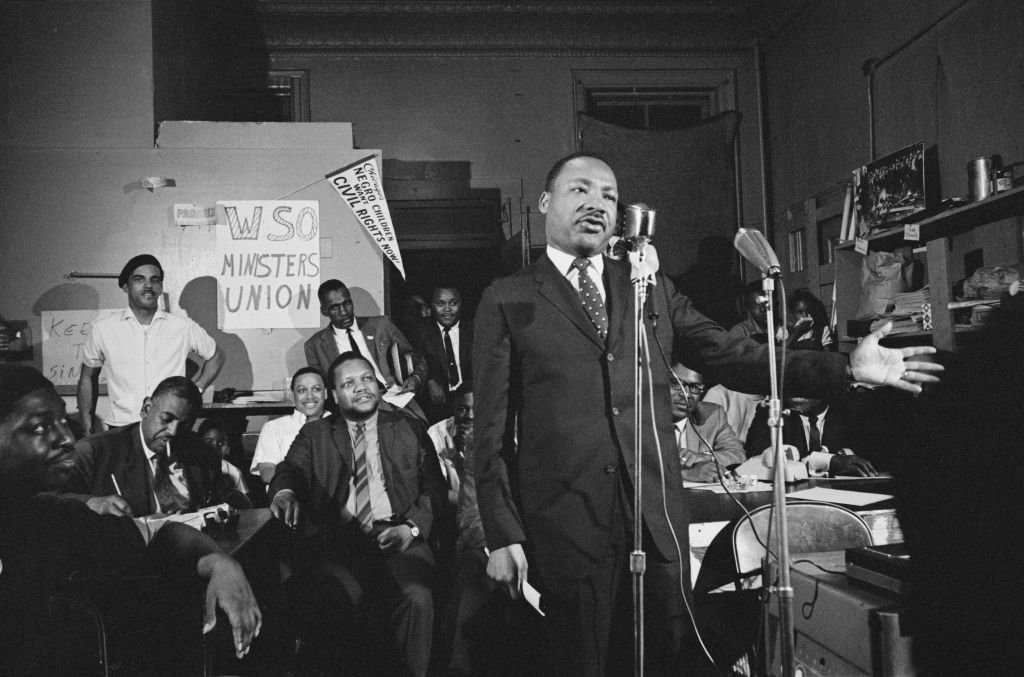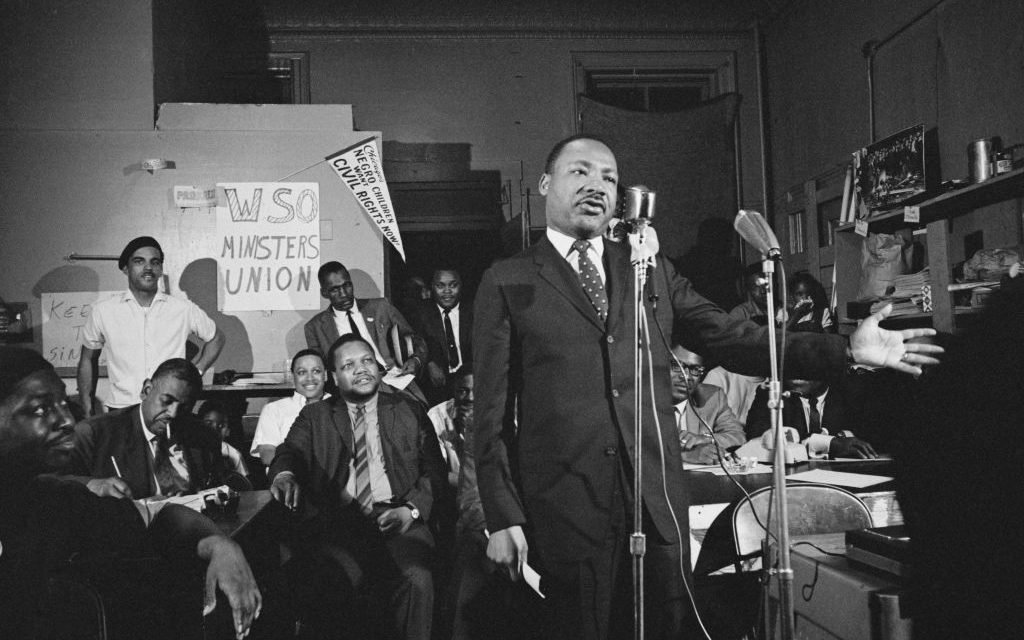
“We shall overcome,
We shall overcome,
We shall overcome, some day.
Oh, deep in my heart,
I do believe
We shall overcome, some day.”
In the 1960s, this hymn, “We Shall Overcome” became the anthem for the Civil Rights Movement. It was sung at the funerals of slain civil rights leaders, and served as a theme of a speech by Dr. Martin Luther King, Jr, setting the tone for the struggle of Black Americans to regain their civil rights.
In 1965, Dr. King delivered a sermon to the interfaith congregation at Temple Israel in Hollywood, California, where he recited parts of the hymn. He would later deliver a speech inspired by this sermon at the National Cathedral in Washington, DC, just days before his assassination. He repeated that resonant line “we shall overcome” several times throughout. These words, “we shall overcome” expressed a hopeful prediction of triumph and that the end of social injustice was inevitable.
But here we are in 2022 and we are in the same struggle, the same fight. This past Monday, we celebrated Martin Luther King Jr. Day–a national holiday to honor the life and legacy of Dr. King and his tireless fight for civil rights for Black Americans. On MLK day, every year, we are flooded with quotes on social media and in the news. Politicians make statements commemorating Dr. King, while at the same time enacting or opposing legislation that disavows the ideals he lived and died to advance.
On MLK day, every year, politicians make statements commemorating Dr. King, while at the same time enacting or opposing legislation that disavows the ideals he lived and died to advance. Share on XI want to maintain the same hope that Dr. King had in his speech: “And I tell you why we shall overcome. Because the arc of the moral universe is long, but it bends toward justice.” It is indeed long. It’s been over five decades since Dr. King was murdered, and we are still fighting the same battles.
In 1965, Dr. King was instrumental in the passage of the Voting Rights Act to protect the right to vote for African Americans. Today, we are still fighting for voting rights. Just last night the Senate Democrats failed to advance voting rights legislation and changes to the filibuster. The voting legislation combines key provisions to two bills: the Freedom to Vote Act and the John Lewis Voting Rights Advancement Act.
In 1965, Dr. King was instrumental in the passage of the Voting Rights Act. Today, we still fight for voting rights. Senate Democrats just failed to advance voting rights legislation and changes to the filibuster. Share on XSome of the things that The Freedom to Vote Act would change include creating a federal standard for voting by mail and drop boxes; expanding early voting options and access to mail-in ballots; and allowing for same-day voter registration on Election Day. The John Lewis Voting Rights Amendment Act, named for the late Georgia Congressman, focuses on restoring the power of the federal government to oversee state voting procedures to prevent discrimination against voters of color. Supreme Court rulings since the passage of the 1965 Voting Rights Act have eroded key portions of the legislation, and this proposal would update the landmark law.
In some way it feels like we are going backwards instead of making progress. I encourage you to reach out to your state representatives to urge them to protect the right to vote at both the state and federal level.
In some way it feels like we are going backwards instead of making progress. I encourage you to reach out to your state representatives to urge them to protect the right to vote at both the state and federal level. Share on X
But, we shall overcome.
After the 2020 murder of George Floyd and the global movement for racial justice that followed, the crusade against critical race theory (CRT) started, fueling the lie that “antiracism is antiwhite.” Antiracist learning in K-12 schools is falsely being portrayed as racist teachings by white conservatives.
The latest attack against CRT is coming out of Florida. Florida Republican Governor Ron DeSantis is pushing a bill that would prohibit public schools and private businesses from making white people feel “discomfort” when they teach students or train employees about discrimination in the nation’s past. This bill received its first approval this week by the state Senate Education Committee. This bill, and other similar legislation being passed in other states, is against everything Dr. King risked his life for.
Ironically, these types of legislation would also preclude kids from learning about Dr. King himself. In Tennessee, for example, the group Moms for Liberty sought to ban Frances E. Ruffin’s children’s book “Martin Luther King Jr. and the March on Washington,” framing its descriptions of segregation and violence as ‘traumatizing and racist.’ The group argues that Ruffin’s portrayal of white racism against people of color “will sow the seeds of racial strife, neo-racism, neo-segregation, and is an affront” to King’s ideals.
We know the truth about CRT. It is education taught primarily in law school to illustrate the impact of laws on racial equity. However, today it’s been weaponized by politicians to scare uninformed (white) voters. King wrote in his 1967 book, “Where Do We Go From Here: Chaos or Community?”:
“Whites, it must frankly be said, are not putting in a similar mass effort to reeducate themselves out of their racial ignorance. It is an aspect of their sense of superiority that the white people of America believe they have so little to learn.”
But, we shall overcome.
We know the truth about CRT. It is education taught primarily in law school to illustrate the impact of laws on racial equity. However, today it’s been weaponized by politicians to scare uninformed (white) voters. Share on XThe ill parts of history seemingly repeating themselves feels disheartening and frustrating to say the least. DEI practitioners like The Winters Group team, and social activists alike, work daily to keep Dr. King’s legacy alive and to actualize his dream. It feels that we should be much further along in 2022, instead of battling the same injustices from the 50s and 60s. I want to remain hopeful.
I leave you with this excerpt from Dr. King’s 1968 National Cathedral speech:
“We shall overcome. Deep in my heart I do believe we shall overcome.
And with this faith we will go out and adjourn the counsels of despair and bring new light into the dark chambers of pessimism and we will be able to rise from the fatigue of despair to the buoyancy of hope. And this will be a great America! We will be the participants in making it so.
And so, as I leave you this evening I say, Walk together children! Don’t you get weary!”



















